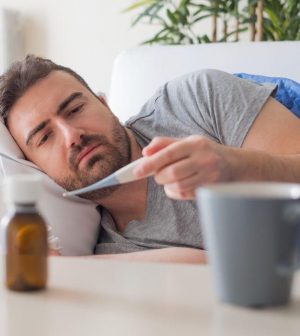- 10 Strategies to Overcome Insomnia
- Could Artificial Sweeteners Be Aging the Brain Faster?
- Techniques for Soothing Your Nervous System
- Does the Water in Your House Smell Funny? Here’s Why
- Can a Daily Dose of Apple Cider Vinegar Actually Aid Weight Loss?
- 6 Health Beverages That Can Actually Spike Your Blood Sugar
- Treatment Options for Social Anxiety Disorder
- Understanding the Connection Between Anxiety and Depression
- How Daily Prunes Can Influence Cholesterol and Inflammation
- When to Take B12 for Better Absorption and Energy
Risk of Long COVID Falls by Half in ‘Breakthrough’ Cases

In a finding that should reassure Americans who have already lined up to get their coronavirus shots, a new study shows the risk of long COVID-19 is halved in fully vaccinated adults if they do get a breakthrough infection.
Researchers analyzed data from people who provided information for a COVID symptom study in the U.K. between Dec. 8, 2020, and July 4, 2021, including 1.2 million who’d received one vaccine dose and more than 971,000 who’d received two doses (fully vaccinated).
Fully vaccinated adults had a 49% reduced risk of long COVID, a 73% reduced risk of hospitalization and a 31% reduced risk of acute symptoms, the study showed.
The most common symptoms among fully vaccinated adults were similar to those in unvaccinated people: loss of smell, cough, fever, headaches, and fatigue. But compared to the unvaccinated, fully vaccinated adults had milder and fewer symptoms, and were half as likely to have multiple symptoms in the first week of illness.
Sneezing was the only common symptom that occurred more often in vaccinated adults, according to the study published Sept. 1 in The Lancet Infectious Diseases journal.
It also found that people who lived in the poorest areas had a greater risk of infection after a single shot. People with frailty and other health conditions that limited their independence were up to two times more more likely to get COVID-19 after vaccination, and of getting sick.
“In terms of the burden of long COVID, it’s good news that our research has found that having a double vaccination significantly reduces the risk of both catching the virus and, if you do, developing longstanding symptoms. However, among our frail, older adults and those living in deprived areas, the risk is still significant and they should be urgently prioritized for second and booster vaccinations,” said lead researcher Claire Steves, from Kings College London.
“Vaccinations are massively reducing the chances of people getting Long COVID in two ways. Firstly, by reducing the risk of any symptoms by 8 to 10 fold and then by halving the chances of any infection turning into long COVID, if it does happen,” said Tim Spector, lead investigator of the COVID symptom study.
“Whatever the duration of symptoms we are seeing that infections after two vaccinations are also much milder, so vaccines are really changing the disease and for the better,” he said in a Kings College news release. “We are encouraging people to get their 2nd jab as soon as they can.”
British Health and Social Care Secretary Sajid Javid said the new findings are encouraging.
“This research is encouraging, suggesting vaccines are not only preventing deaths but could also help prevent some of the longer lasting symptoms,” he said in the news release. “It is clear vaccines are building a wall of defense against the virus and are the best way to protect people from serious illness.”
More information
The U.S. Centers for Disease Control and Prevention has more on post-COVID symptoms.
SOURCES: Kings College London, news release, Sept. 1, 2021
Source: HealthDay
Copyright © 2026 HealthDay. All rights reserved.










